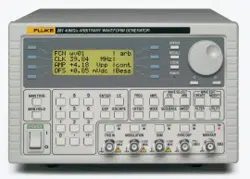Loading ...
Loading ...
Loading ...

291, 292, 294
Users Manual
Introduction
Both internal and external Sum can be selected; summing can be used to add ‘noise’ to a
waveform, for example, or to add two signals for DTMF (Dual Tone Multiple Frequency)
testing.
External sum can be applied to any or all channels. Internal sum uses the previous
channel as the source, so that for example channel 2 can be added into channel 3; internal
sum is not available on channel 1 or on a single channel instrument.
Summing shares some of the generator’s inter-channel resources with the modulation
modes; as a result neither internal nor external sum can be used with internal modulation
but external modulation is still possible with sum.
To better understand the constraints, the following sections (and chapter 11, Modulation)
should be read with reference to the block diagrams at the end of the manual. These show
the control signals in a single channel and the inter-channel connections.
The diagrams also show the inter-channel trigger connections described in chapter 7,
Triggered Burst and Gate; in general, inter-channel triggering is possible simultaneously
with summing.
External Sum
In sum mode an external signal applied to the SUM input is summed with the
waveform(s) on the specified channel(s). The same sum input signal can be used at
different amplitudes with each of the channels with which it is summed.
Pressing the SUM key calls the SUM set-up screen:
SUM source: ext
CH1 +2.00 Vpp
Pressing the source soft-key steps the sum source between off, external and
CHx (where x is the number of the previous channel). With ext selected the screen
is as shown above.
Clipping will occur if the sum input level attempts to drive the channel amplitude above
the maximum 20 V p-p open-circuit voltage. However, the relationship between the
EXT SUM input and the maximum summed output depends not only on the sum input
level but also on the channel's own amplitude setting. This is because the sum input is
applied to the amplifier chain prior to the output attenuators. The amplifier itself is
controlled over a limited range (approximately10 dB) and the full amplitude range of the
channel is achieved by switching in up to five 10 dB attenuation stages. The summed
output cannot exceed the maximum of the range within which the channel output has
been set by choice of amplitude setting. Whereas with internal sum the generator gives
warnings when the combination of sum input and amplitude would cause waveform
clipping (see Internal Sum below), it is the responsibility of the user to observe the
waveforms when using external sum and to make adjustments if the waveform is clipped.
Note that it is not possible to give a simple guide as to where the range breakpoints are
because the use of dc offset, for example, changes these points.
Within each range an EXT SUM signal of approximately 2 V p-p will force the channel
output from the range minimum to the range maximum; if the channel amplitude is set to
12-2
1.888.610.7664 sales@GlobalTestSupply.com
Fluke-Direct.com
Loading ...
Loading ...
Loading ...
